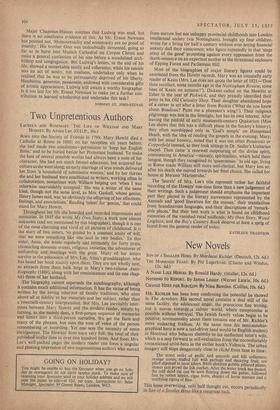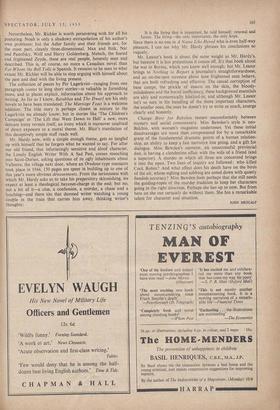New Novels
SON OF A SMALLER HERO. By Mordecai Richter. (Deutsch, 12s. 6d.)
MR. RICHLER has been busy confirming the potential he showed in 'The Acrobats. His second novel contains a deal still of the same facility, the adolescent anger, the precocious fine writing, but it moves towards. a calmer world, where compromise is possible without betrayal. The Jewish family values begin to be positive; sentimentality about them remains one of Mr. Richler's more endearing frailties. At the same time his semi-autobio- graphical hero is now a taxi-driver (and would-be English student) in Montreal who behaves shabbily to his ineffectual tutor's wife, which is a step forward in self-realisation from the uncomfortably romanticised artist-hero in the earlier book's Valencia. The urban
imagery still slops dangerously close to cliché from time to time : The street reeks of garlic and quarrels and bill collectors; orange crates, stuffed full with garbage and decaying fruit, are piled slipshod in most alleys. Swift children gobble pilfered plums, slower cats prowl the fish market. After the water truck has passed, the odd dead rat can be seen floating down the gutter, followed fast by rotten apples, cigar butts, chunks of horse manure and a terrifying zigzag of flies.
This loose overwriting, only half thought out, occurs periodically in Son of a Smaller Hero like a recurrent rash.
Nevertheless, Mr. Richler is worth persevering with for all his posturing. Noah is only a shadowy extrapolation of his author's own problems; but the Adler family and their friends are, for the most part, cleanly three-dimensional. Max and Itzik, Nat and Panofsky, Wolf and Harry Goldenberg, Melech, the feared and frightened Zeyda, these are real people, honestly seen and described. This is, of course, no more a Canadian novel than For Whom the Bell Tolls is Spanish. It remains to be seen to what extent Mr. Richler will be able to stop arguing with himself about the past and deal with the living present.
The collection of pieces by Par Lagerkvist—ranging from one paragraph conies to long short stories—is valuable in furnishing more, and in places explicit, information about his approach to writing. As far as I know, Barabbas and The Dwarf are his only novels to have been translated; The Marriage Feast is a welcome addition. The title story is perhaps closest is texture to the Lagerkvist we already know; but in stories like 'The Children's Campaign' or 'The Lift that Went Down to Hell' a new, more delicate irony reveals itself, an irony which is moreover unafraid of direct exposure to a moral theme. Mr. Blair's translation of this deceptively simple stuff reads well.
Mr. Hardy now, with a simple enough theme, gets so tangled up with himself that he forgets what he wanted to say. For after our old friend, that infuriatingly sensitive and aloof character, the Lonely English Writer With A Sad Past, comes mooching into Saint-Dorien, asking questions of its ugly inhabitants about Vallestre, the village next door, where an Oradour-type massacre took place in 1944, 150 pages are spent in building up to one of this year's more obvious dénouements. From the seriousness with which Mr. Hardy asks us to take his preparatory skirmishing, we expect at least a theological bayonet-charge at the end; but no, not a bit of it—a clue, a confession, a murder, a chase and a lynching—and there sits that damned writer watching a young couple in the train that carries him away, thinking writer's thoughts:
It is the living that is important, he told himself; renewal and future. The living—the only importance, the only hope.
Since there is no one in A Name Like Herod who is even half-way pleasant, I can see why Mr. Hardy phrases his conclusions so vaguely.
Mr. Leasor's book is about the same weight as Mr. Hardy's, but because it is less pretentious it comes off. It's that book about the war in Burma, which you know well enough; but Mr. Leasor brings to Nothing to Report a journalist's straightforwardness, and an on-the-spot sureness about how frightened men behave, that are both refreshing and effective. The casual corruption of base camps, the prickle of insects on the skin, the bloody- mindedness and the bored inefficiency, these background essentials are ably and economically blocked-in; and although Mr. Leasor isn't so sure in his handling of the more important characters, the smaller ones, the ones he doesn't try to write so much, emerge clearly and honestly.
Change Here for Babylon teeters uncomfortably between mystery and social commentary. Miss Bawden's style is neo- Balchin, with women's magazine undertones. Yet these initial disadvantages are more than compensated for by a remarkable grasp of the fundamental dramatic points of a human relation- ship, an ability to keep a fast narrative line going, and a gift for dialogue. Miss Bawden's narrator, an unsuccessful provincial don, is having a clandestine affair with the wife of a friend (and a superior). A murder in which all three are concerned brings it into the open. Two lines of inquiry are followed: who killed Cock Robin? And what effect does his death have on the birds of the air, whose sighing and sobbing are noted down with quietly fiendish accuracy? Miss Bawden feels perhaps that she still needs the guiding-ropes of the murder tradition to keep her characters going in the right direction. Perhaps she has up to now. But from here on she can certainly do without them. She has a remarkable talent for character and situation.
JOHN METCALF



































 Previous page
Previous page